Receive ENBOTS Meeting Reports |
||
|
Receive our ENBOTS bulletins and reports by email: |
||

| Follow @enbclimate | ||

Loading... |
||
|
Receive emailed updates with the news articles above plus related information and announcements from our CLIMATE-L community mailing list: |
||
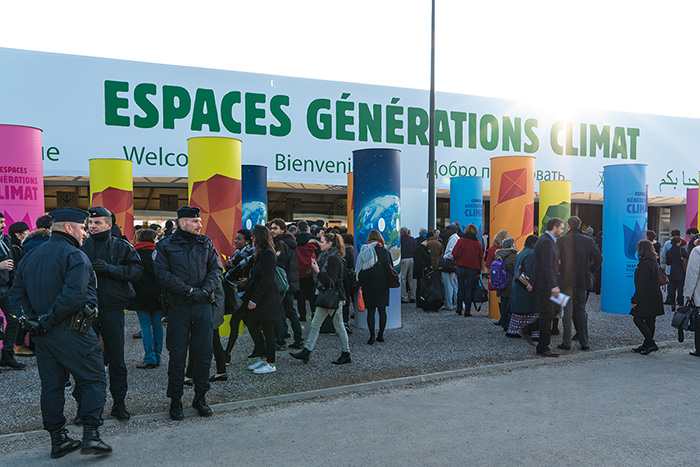 Participants entering UNFCCC COP21 in the morning
Participants entering UNFCCC COP21 in the morning|
The following side events were covered by ENBOTS on Monday, 7 December 2015:
|
||
|
IISD Reporting Services, through its ENB on the Side (ENBOTS) Meeting Coverage, is providing web coverage, including photos and video, of an average of nine daily side events from the Paris Climate Change Conference - November-December 2015. | ||
Compact of Mayors: the World´s Largest Coalition on Local Climate Action and Towards SDGs/HABITAT3 Presented by: ICLEI – Local Governments for Sustainability and United Cities and Local Governments (UCLG) - on behalf of the Compact of Mayors Management Committee
This side event, moderated by Gino Van Begin, Secretary General, ICLEI, provided an opportunity for dialogue to explore options for enhanced engagement of local and subnational governments in raising the level of ambition and accelerating climate action at all levels, based on the outcomes of COP 21.
Van Begin addressed the achievements of the Compact of Mayors, a common platform that builds upon a number of other initiatives, aiming to capture the impact of cities’ collective actions through standardized measurement of emissions and climate risk, and consistent, public reporting of their efforts.
Yunus Arikan, ICLEI, provided an overview of the efforts of local governments regarding climate change since 1993, noting that their aim post-2015 is to raise the level of ambition and accelerate action.
Amanda Eichel, Bloomberg Philanthropies, Compact of Mayors Secretariat, presented on the nature, role and unique features of the Compact of Mayors, as well as their partnerships.
Seth Schultz, Director, C40, described the phases of cities’ participation in the Compact of Mayors, namely through commitment, inventory, target setting and climate action planning. He highlighted “ClearPath,” an online GHG calculator and “Curbtool,” a scenario planning tool, as well as the framework for climate risk adaptation and taxonomy.
Focusing on reporting, Maryke van Staden, ICLEI, noted that 428 cities have already committed to the Compact of Mayors and 43 of them are fully compliant. She noted that commitments already made could account for half of the total urban potential for emissions reduction by 2020, and highlighted planned activities for 2016.
Natalène Poisson, UCLG, delivered a message by Kadir Topbaş, UCLG President and Mayor of Istanbul, underscoring links between climate and sustainability, as well as among energy and climate change mitigation, and behavioral change. She stressed that technical solutions are not enough without sound governance.
Noting that many US mayors have stepped up to address climate change challenges, Frank Cownie, Mayor, Des Moines, US, stressed the importance of “ClearPath,” which enables cities to compare their work, set targets, make reductions and commit to the Compact of Mayors.
Stephany Uy-Tan, Mayor, Catbalogan, the Philippines, urged regional cooperation, underscoring rapid urbanization and high vulnerability, and noting the region is hit by five super typhoons per year.
Carlos Amastha, Mayor, Palmas, Brazil, said that Latin America is the most urbanized continent with mid-sized cities accounting for 65% of total urban areas. Noting that Palmas is a 25 year-old city, he urged for support for sustainable urban planning, not to repeat the same mistakes.
Hong-mo Wu, Deputy Mayor, Kaohsiung, Chinese Taipei, highlighted efforts that transformed Kaohsiung from an industrial, energy-consuming, polluted and polluting city, to a sustainable one, the first Asian city to be fully compliant with the Compact of Mayors.
James Nxumalo, Mayor, Durban, South Africa, highlighted Durban’s long and successful relationship with ICLEI, noting the city aims to reduce its emissions by 28% by 2020. He stressed combined mitigation and adaptation strategies to effectively tackle climate change, noting that the Compact of Mayors provides the necessary framework.
Tikender Panwar, Deputy Mayor, Shimla, India, listed efforts to make Shimla a carbon-neutral city, including afforestation laws and a ban on car purchases without corresponding parking permits, and urged increased cooperation between the different levels of government.
George Ferguson, Mayor, Bristol, UK, underscored cooperation to increase visibility of the role of cities to address climate change and highlighted the role of the Compact of Mayors as a tool enabling them to benchmark their efforts across other cities.
Arron Wood, Councilor, Melbourne, Australia, noted that Melbourne, despite its largely successful efforts, still has a lot to learn from other cities, stressing that the city’s power is derived from similar networks of cooperation.
Ronan Dantec, Senator, France, underscored that cities speak with a common voice at climate change negotiations, representing their common culture, rather than national interests, and noted that without mobilization of local and subnational governments, climate change targets will prove unattainable.
Sharon Dijksma, Minister for the Environment, the Netherlands, said that cities have the power to achieve concrete results, not only by reducing emissions but also by incentivizing other actors. She focused on delta cities, noting that exchange of knowledge is necessary to increase resilience of urban deltas.
Joan Clos, Executive Director, UN-Habitat, noted that HABITAT III is well placed in the international agenda and focused on the contribution of urbanization to sustainable development. He stressed that rates of urbanization will grow only if conditions do not change, and called for a different model of urbanization that is sustainable and can be transmitted to the developing world.
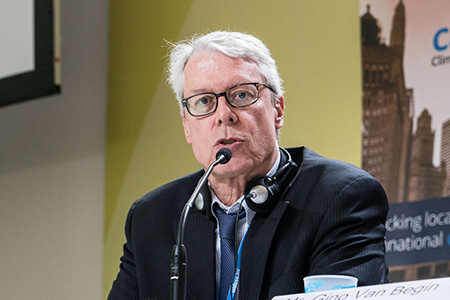 Commenting on GHG emissions, Frank Cownie, Mayor, Des Moines, US, noted "if you cannot measure it, you cannot manage it."
Commenting on GHG emissions, Frank Cownie, Mayor, Des Moines, US, noted "if you cannot measure it, you cannot manage it."
| 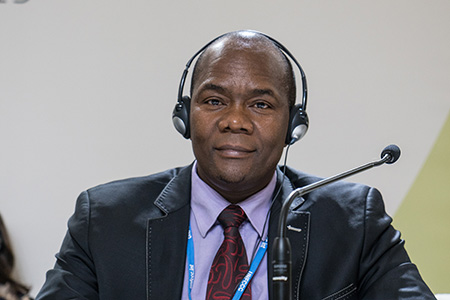 James Nxumalo, Mayor, Durban, South Africa, said that cities have the ability to implement climate change programmes more rapidly and effectively.
James Nxumalo, Mayor, Durban, South Africa, said that cities have the ability to implement climate change programmes more rapidly and effectively.
|
 Panel (L-R):
Yunus Arikan, ICLEI; Gino Van Begin, Secretary General, ICLEI; Amanda Eichel, Bloomberg Philanthropies, Compact of Mayors Secretariat; Seth Schultz, Director, C40; Maryke van Staden, ICLEI; and Natalène Poisson, UCLG.
Panel (L-R):
Yunus Arikan, ICLEI; Gino Van Begin, Secretary General, ICLEI; Amanda Eichel, Bloomberg Philanthropies, Compact of Mayors Secretariat; Seth Schultz, Director, C40; Maryke van Staden, ICLEI; and Natalène Poisson, UCLG.
|
 Hong-mo Wu, Deputy Mayor, Kaohsiung, Chinese Taipei, noted Kaohsiung was the first Asian city to become fully compliant with the Compact of Mayors.
Hong-mo Wu, Deputy Mayor, Kaohsiung, Chinese Taipei, noted Kaohsiung was the first Asian city to become fully compliant with the Compact of Mayors.
| 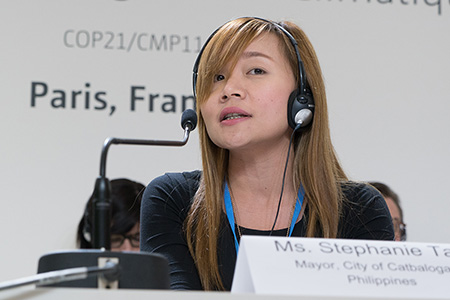 Stephany Uy-Tan, Mayor, Catbalogan, the Philippines, described the special circumstances in the area, urging synergies at the regional and national level.
Stephany Uy-Tan, Mayor, Catbalogan, the Philippines, described the special circumstances in the area, urging synergies at the regional and national level.
|
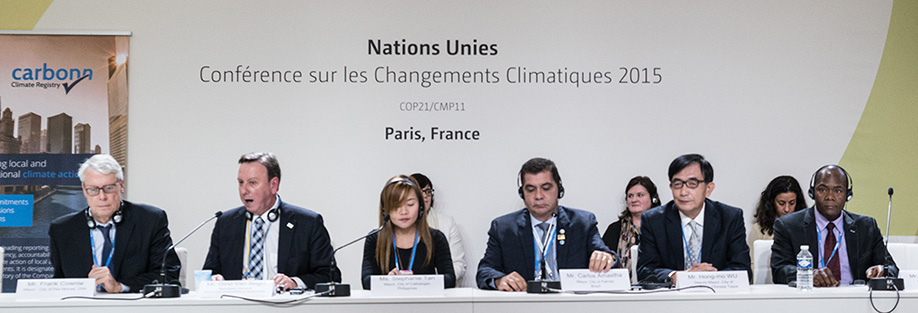 Panel (L-R):
Frank Cownie, Mayor, Des Moines, US; Gino Van Begin, Secretary General, ICLEI; Stephany Uy-Tan, Mayor, Catbalogan, the Philippines; Carlos Amastha, Mayor, Palmas, Brazil; Hong-mo Wu, Deputy Mayor, Kaohsiung, Chinese Taipei; and James Nxumalo, Mayor, Durban, South Africa.
Panel (L-R):
Frank Cownie, Mayor, Des Moines, US; Gino Van Begin, Secretary General, ICLEI; Stephany Uy-Tan, Mayor, Catbalogan, the Philippines; Carlos Amastha, Mayor, Palmas, Brazil; Hong-mo Wu, Deputy Mayor, Kaohsiung, Chinese Taipei; and James Nxumalo, Mayor, Durban, South Africa.
|
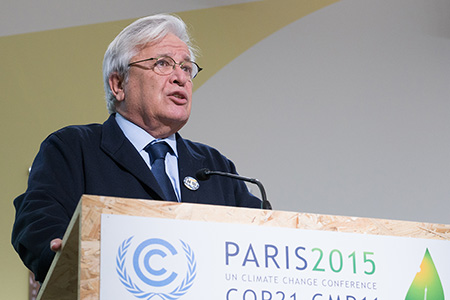 Joan Clos, Executive Director, UN-Habitat, underscored that in the 2030 Agenda for Sustainable Development urbanization has been singled out for the first time as a factor of development.
Joan Clos, Executive Director, UN-Habitat, underscored that in the 2030 Agenda for Sustainable Development urbanization has been singled out for the first time as a factor of development.
| 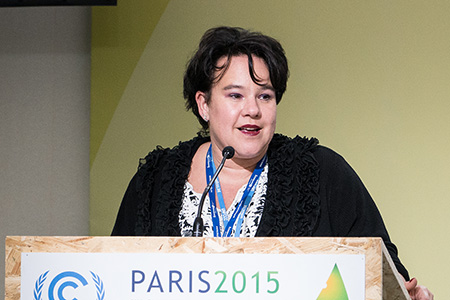 Sharon Dijksma, Minister for the Environment, the Netherlands, stressed that delta cities are at the frontline of climate change.
Sharon Dijksma, Minister for the Environment, the Netherlands, stressed that delta cities are at the frontline of climate change.
|
 Panel (L-R):
Gino Van Begin, Secretary General, ICLEI; Tikender Panwar, Deputy Mayor, Shimla, India; George Ferguson, Mayor, Bristol, UK; Arron Wood, Councilor, Melbourne, Australia; and Ronan Dantec, Senator, France.
Panel (L-R):
Gino Van Begin, Secretary General, ICLEI; Tikender Panwar, Deputy Mayor, Shimla, India; George Ferguson, Mayor, Bristol, UK; Arron Wood, Councilor, Melbourne, Australia; and Ronan Dantec, Senator, France.
|
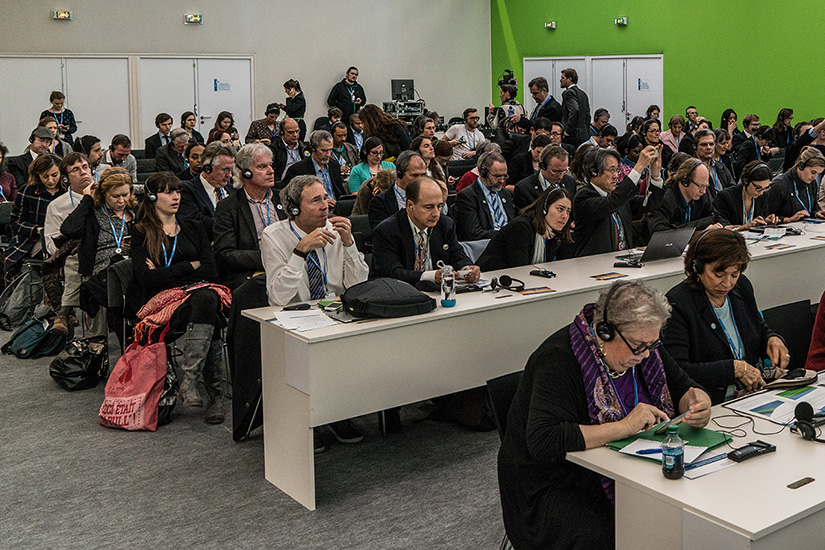
|
Contacts:
- Yunus Arikan (Coordinator) | yunus.arikan@iclei.org
- Natalène Poisson (Coordinator) | n.poisson@uclg.org
More Information:
Building Island Resilience Through Innovative Financing and Biodiversity Solutions Presented by: The Nature Conservancy
This event, moderated by Kate Brown, Executive Director, Global Island Partnership, announced the world’s first Debt Swap for Marine Conservation and Climate Adaptation, recently finalized between the government of Seychelles and the Paris Club of Creditors, with support from The Nature Conservancy. The event considered the potential of a debt swap model to integrate island resilience, climate financing and biodiversity in some of the most vulnerable Small Island Developing States (SIDS) in the world.
James Michel, President of the Seychelles, underscored the Debt Swap as a pivotal moment in history, which places nature at the centre of climate change solutions. He explained the Debt Swap will catalyse the creation of 400,000 square km of marine protected areas.
Didier Dogley, Minister of Environment, Energy and Climate Change, Seychelles, highlighted that this is the first time a country has used their historic debt to finance a mechanism for climate mitigation and adaptation on the ground. Mark Tercek, President, The Nature Conservancy, underscored the unique nature of the debt swap and outlined The Nature Conservancy’s role in working with stakeholders and local communities during the establishment of the new marine protected area.
Jacob James, Managing Director, Waitt Foundation, expressed hope that the debt swap model will act as a catalyst for island states throughout the world. Bruno Fulda, Counselor of Ecology, Embassy of France in the US, congratulated the Debt Swap and emphasized its importance for people throughout the world.
Benoît Bosquet, World Bank, highlighted oceans as a key focus of the bank’s work on climate adaptation, and a crucial element of efforts to eradicate poverty. Bruce Kijiner, Ministry for Foreign Affairs, Marshall Islands, noted the “double burden” many SIDS are experiencing repaying national debt while dealing with climate adaptation.
During the ensuing discussion, government representatives from Grenada, Palau and Jamaica expressed strong interest in replicating the project. Ronald Jumeau, Ambassador for Climate Change and SIDS Issues, Seychelles, closed the session by saying small island states are coming out as leading innovators of solutions that will help the world mitigate climate change and conserve marine biodiversity.
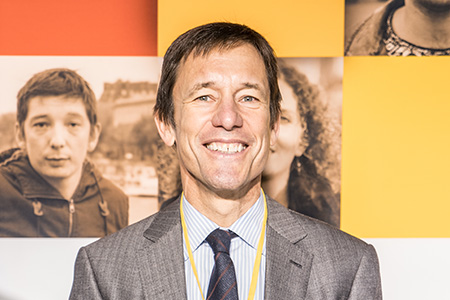 Mark Tercek, President, The Nature Conservancy, highlighted the establishment of Naturevest, an investment entity that aims to provide “impact capital” for conservation efforts as well as financial returns for investors.
Mark Tercek, President, The Nature Conservancy, highlighted the establishment of Naturevest, an investment entity that aims to provide “impact capital” for conservation efforts as well as financial returns for investors.
| 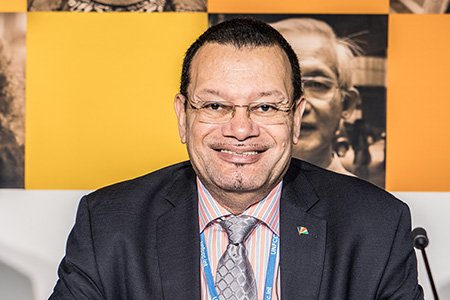 Ronald Jumeau, Ambassador for Climate Change and Small Island Developing States Issues, Seychelles, said “the Seychelles are not waiting for the outcome of COP 21,” as “time is a luxury we cannot afford.”
Ronald Jumeau, Ambassador for Climate Change and Small Island Developing States Issues, Seychelles, said “the Seychelles are not waiting for the outcome of COP 21,” as “time is a luxury we cannot afford.”
|
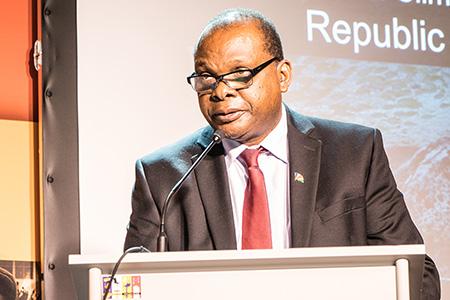 Didier Dogley, Minister of Environment, Energy and Climate Change, Seychelles, said this debt restructure will be a building block for the “blue economy,” nurturing livelihoods based on coastal and ocean resources.
Didier Dogley, Minister of Environment, Energy and Climate Change, Seychelles, said this debt restructure will be a building block for the “blue economy,” nurturing livelihoods based on coastal and ocean resources.
| 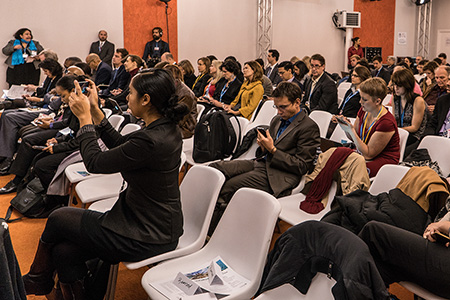 A view of the room during the side event.
A view of the room during the side event.
|
 Panel (L-R):
Benoît Bosquet, World Bank; Jacob James, Director, Waitt Foundation; Mark Tercek, President, The Nature Conservancy; Ronald Jumeau, Ambassador for Climate Change and Small Island Developing States Issues, Seychelles; Didier Dogley, Minister of Environment, Energy and Climate Change, Seychelles; and Kate Brown, Executive Director, Global Island Partnership.
Panel (L-R):
Benoît Bosquet, World Bank; Jacob James, Director, Waitt Foundation; Mark Tercek, President, The Nature Conservancy; Ronald Jumeau, Ambassador for Climate Change and Small Island Developing States Issues, Seychelles; Didier Dogley, Minister of Environment, Energy and Climate Change, Seychelles; and Kate Brown, Executive Director, Global Island Partnership.
|
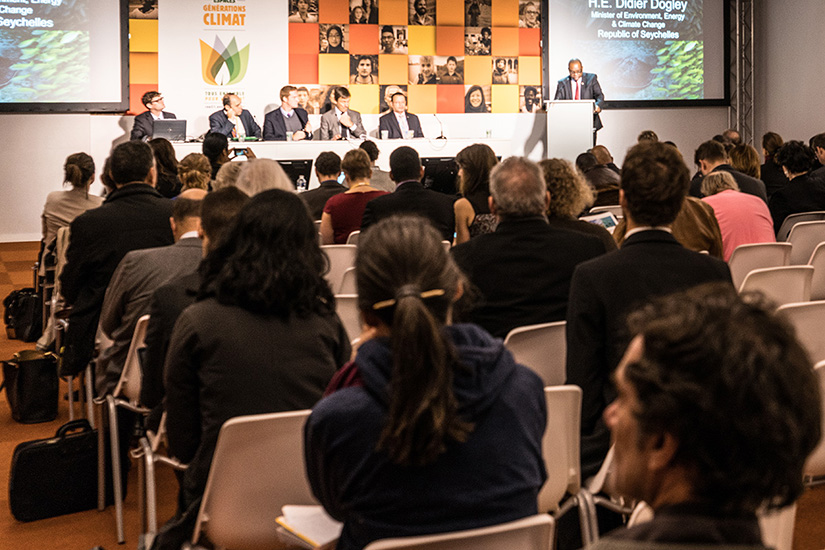
|
Contacts:
- Krista Singleton-Cambage (Coordinator) | ksingleton@tnc.org
- Rob Weary (Coordinator) | rweary@tnc.org
More Information:
The Pivotal Role of Water in Climate Change Adaptation and Mitigation Presented by: United Nations Water (UN-Water)
This side event, moderated by Karin Lexén, Stockholm International Water Institute (SIWI), considered the centrality of water for climate change adaptation and mitigation, as well as good practices to adapt water management and water services to climate change.
Introducing the event, Michel Jarraud, Chair, UN-Water, informed participants that 31 UN units cooperate with 38 external partners on water issues through UN-Water.
Gabriel Quijandría, Deputy Minister for Strategic Development of Natural Resources, Ministry of Environment, Peru, delivered the opening remarks, highlighting the launch of the Paris Pact on Water and Climate Change Adaptation, as well as of the Business Alliance for Water and Climate Change at COP 21.
Nomvula Mokonyane, Minister of Water and Sanitation, South Africa, underscored that water management calls for: integrated solutions; a review of how resources are allocated; leadership at every level, in every country; and a move away from compartmentalized approaches.
Highlighting the need to understand the interaction between energy, water and food, Angela Kallhauge, International Renewable Energy Agency (IRENA), urged better coordination, information, and cooperation between countries.
Chris Coleman, Mayor, Saint Paul, Minnesota, shared insights on the management of the Mississippi River Basin, emphasizing the role of locally elected officials.
Bernard Giraud, President, Livelihoods Venture, shared experience with a project on ecosystems and natural infrastructure involving 30,000 farmers in Kenya.
Said Mouline, General Director, Agency for the Development of Renewable Energy and Energy Efficiency, Morocco, presented Morocco’s experience with solar photovoltaic water pumping.
The ensuing discussion addressed: coherence and inter-institutional cooperation around water; the role of legislation and awareness-raising; adaptation finance; and multilevel water governance.
Noting the positive message emerging from the discussion, Blanca Jimenez Cisneros, Vice-Chair, UN-Water, closed the event, highlighting opportunities to address climate change and water management in a synergistic way.
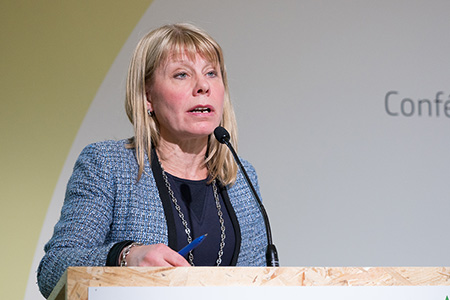 Karin Lexén, SIWI, moderated the event.
Karin Lexén, SIWI, moderated the event.
| 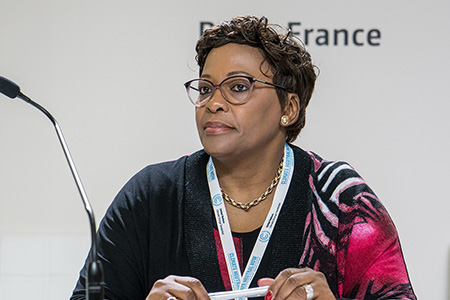 Nomvula Mokonyane, Minister of Water and Sanitation, South Africa, called for more finance for water management solutions.
Nomvula Mokonyane, Minister of Water and Sanitation, South Africa, called for more finance for water management solutions.
|
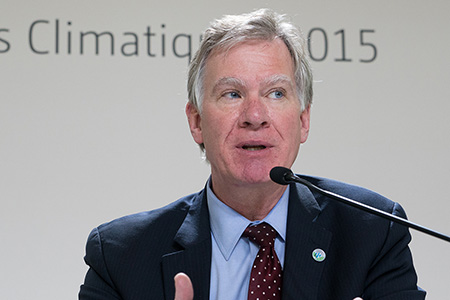 Chris Coleman, Mayor of Saint Paul, Minnesota, shared insights on strategic management of the Mississippi River Basin.
Chris Coleman, Mayor of Saint Paul, Minnesota, shared insights on strategic management of the Mississippi River Basin.
| 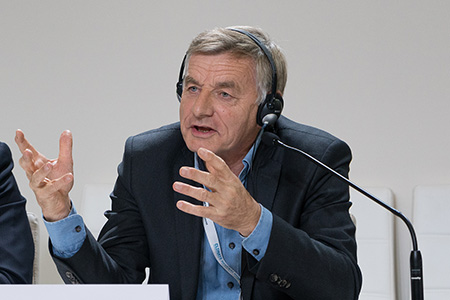 Bernard Giraud, President, Livelihoods Venture, presented a project on ecosystems and natural infrastructure in Kenya.
Bernard Giraud, President, Livelihoods Venture, presented a project on ecosystems and natural infrastructure in Kenya.
|
 Panel (L-R): Karin Lexén, SIWI;
Angela Kallhauge, IRENA; Nomvula Mokonyane, Minister of Water and Sanitation, South Africa; Chris Coleman, Mayor, Saint Paul, Minnesota; Bernard Giraud, President, LivelihoodsVenture; and Said Mouline, General Director, Agency for the Development of Renewable Energy and Energy Efficiency, Morocco.
Panel (L-R): Karin Lexén, SIWI;
Angela Kallhauge, IRENA; Nomvula Mokonyane, Minister of Water and Sanitation, South Africa; Chris Coleman, Mayor, Saint Paul, Minnesota; Bernard Giraud, President, LivelihoodsVenture; and Said Mouline, General Director, Agency for the Development of Renewable Energy and Energy Efficiency, Morocco.
|
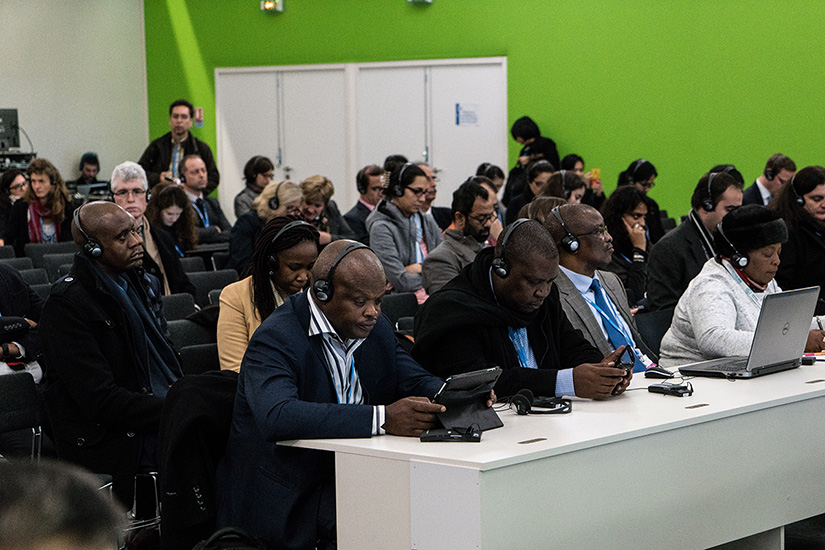
|
Contacts:
- Sophia Koeppel (Coordinator) | sonja.koeppel@unece.org
Fossil Fuel Subsidies and Climate Change Presented by: Friends of Fossil Fuel Subsidy Reform (FFFSR) and International Institute for Sustainable Development (IISD)
Moderator Tim Groser, Minister of Trade and Climate Change Issues, New Zealand, introduced the session which focused on progress towards phasing out fossil fuel subsidies (FFS). He referred to the positive momentum to implement a carbon price into the global market in the next two decades, lamenting that the continued subsidising of fossil fuels was the “height of policy incoherence.”
Doris Leuthard, Head, Federal Department of Environment, Transport, Energy and Communications, Switzerland, Switzerland, said that FFS are delaying the economic need to switch to renewable energy (RE), reporting on International Energy Agency (IEA) estimates that a partial phase out of FFS would generate 12% of the global abatement needed by 2020 to achieve a 2ºC pathway.
Fatih Birol, Executive Director, IEA, referred to the “absurd situation” of the opposite forces at work in the global energy economy, in which the carbon price in Europe is approximately US$10, yet incentives for fossil fuel use, in the form of FFS, equate to a global average of US$110 per tonne of carbon.
Børge Brende, Minister of Foreign Affairs, Norway, described FFS as “negative climate finance” that contradicts the common objective of cutting emissions as well as weakens efforts to promote RE alternatives. He lamented the “paradox” that FFS amount to five times the global annual climate finance commitment of US$100 billion.
Ibrahim Aylan, Minister for Energy, explained that while Sweden’s domestic greenhouse gas (GHG) emissions have declined 24% since 1990, emissions from consumption of goods and international transport have increased. He suggested carbon pricing as an effective method to tackle this international dimension of climate change.
Scott Vaughan, President, IISD, highlighted detailed research from IISD across 19 of the G20 countries has found US$78 billion in subsidies, which he said is around 15 times more than goes into adaptation funding for developing countries every year.He underscored three key points: the removal of FFS will be instrumental in mitigating climate change; the urgent need for further work on subsidies to producers; and subsidy reform as an enabler of fiscal savings that can address sustainable development.
Risto Piipponen, Ambassador to France, Finland, underscored Finland’s participation in the FFFSR, which aims to create a level playing field for renewable energy and to remove inefficient FFS to free up resources for sustainable development and climate change action. He observed that, while Finland does not have direct FFS, work must be done to address indirect FFS.
Felipe Calderón, Chair, Global Commission on Economy and Climate, pointed to studies revealing that only 3% of FFS reaches the poorest 20% of households, underscoring that supporting poor families and improving energy access are not substantiated reasons for FFS. He called for addressing the difficult political reasons that perpetuate FFS, such as pressure from the electorate to not increase the prices of electricity and fuel.
 Doris Leuthard, Head, Federal Department of Environment, Transport, Energy and Communications, Switzerland, Switzerland, said successfully addressing FFS reform is “more like a marathon than a sprint,” requiring determination and perseverance.
Doris Leuthard, Head, Federal Department of Environment, Transport, Energy and Communications, Switzerland, Switzerland, said successfully addressing FFS reform is “more like a marathon than a sprint,” requiring determination and perseverance.
| 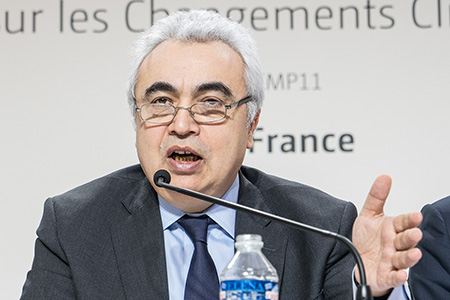 Fatih Birol, Executive Director, IEA, called for for a carbon price to form part of the COP 21 outcome, referring to such a price as “one of the best solutions” to address climate change.
Fatih Birol, Executive Director, IEA, called for for a carbon price to form part of the COP 21 outcome, referring to such a price as “one of the best solutions” to address climate change.
|
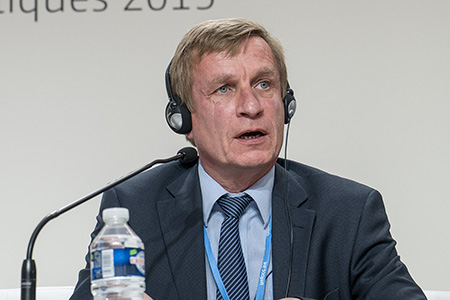 Risto Piipponen, Ambassador to France, Finland, indicated that the socio-economic benefits of subsidies should be considered when looking at alternatives.
Risto Piipponen, Ambassador to France, Finland, indicated that the socio-economic benefits of subsidies should be considered when looking at alternatives.
| 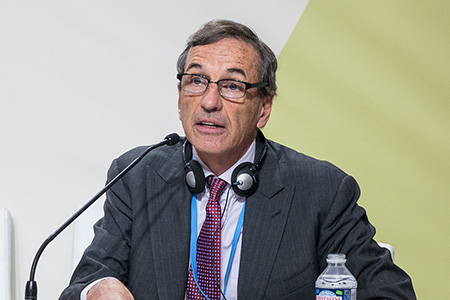 Scott Vaughan, President and CEO, IISD, said FFS are encouraging greater consumption of fossil fuels by artificially deflating their cost.
Scott Vaughan, President and CEO, IISD, said FFS are encouraging greater consumption of fossil fuels by artificially deflating their cost.
|
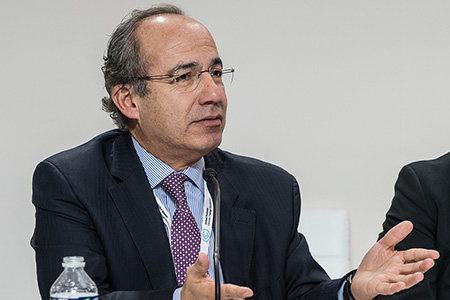 Felipe Calderón, Chair, Global Commission on Economy and Climate, suggested that it is rich families with greater energy use get the most benefit from FFS, noting that reforms should be implemented in a way to benefit low-income households.
Felipe Calderón, Chair, Global Commission on Economy and Climate, suggested that it is rich families with greater energy use get the most benefit from FFS, noting that reforms should be implemented in a way to benefit low-income households.
| 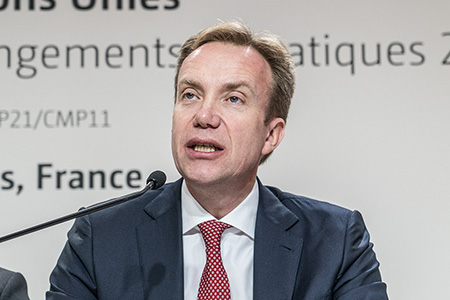 Reporting on the “huge budget deficits” attributable to FFS in many countries, Børge Brende, Minister of Foreign Affairs, Norway, said the real question is “how can we afford not to reform FFS?”
Reporting on the “huge budget deficits” attributable to FFS in many countries, Børge Brende, Minister of Foreign Affairs, Norway, said the real question is “how can we afford not to reform FFS?”
|
 Panel (L-R):
Tim Groser, Minister of Trade and Climate Change Issues, New Zealand; Felipe Calderón, Chair, Global Commission on Economy and Climate; Ibrahim Aylan, Minister for Energy, Sweden; Fatih Birol, Executive Director, IEA; Børge Brende, Minister of Foreign Affairs, Norway; Amb. Risto Piipponen, Ambassador to France, Finland; Doris Leuthard, Head, Federal Department of Environment, Transport, Energy and Communications, Switzerland; Scott Vaughan, President and CEO, IISD.
Panel (L-R):
Tim Groser, Minister of Trade and Climate Change Issues, New Zealand; Felipe Calderón, Chair, Global Commission on Economy and Climate; Ibrahim Aylan, Minister for Energy, Sweden; Fatih Birol, Executive Director, IEA; Børge Brende, Minister of Foreign Affairs, Norway; Amb. Risto Piipponen, Ambassador to France, Finland; Doris Leuthard, Head, Federal Department of Environment, Transport, Energy and Communications, Switzerland; Scott Vaughan, President and CEO, IISD.
|
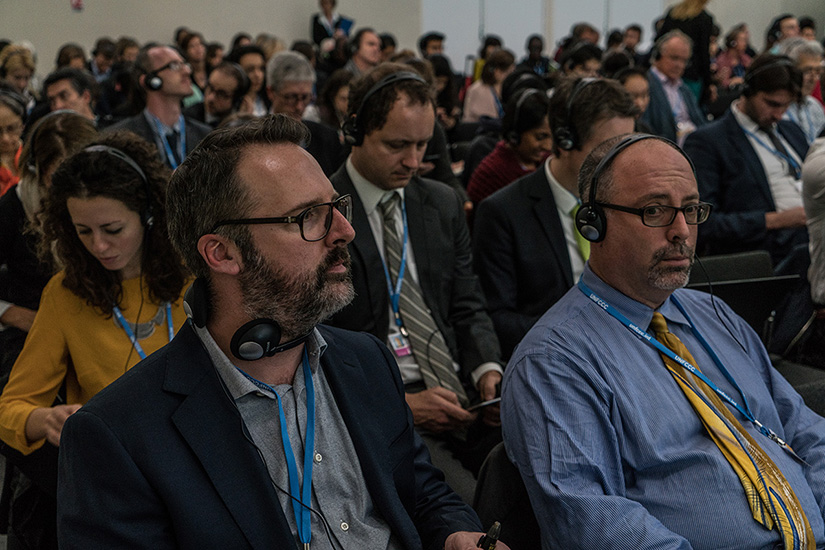
|
Contacts:
- Laura Merrill (Coordinator) | lmerrill@iisd.org
- Lasse Toft | ltchristensen@iisd.org
More Information:
Energy Efficiency Improvements with Mitigation Co-Benefits through Economic Diversification Presented by: Gulf Cooperation Council (GCC)
This side event considered GCC countries’ energy efficiency efforts and technologies, and was moderated by Ali Al-Qahtani, Saudi Aramco.
Matar Hamed Al-Niadi, Ministry of Energy, UAE, and Chairman, GCC Interconnection Authority, welcomed participants, calling energy efficiency “the first source of energy” and stressing that all GCC countries have energy efficiency initiatives.
Mohammed Al Mutawa, Ministry of Energy, UAE, presented on energy efficiency practices in the UAE, introducing the UAE Climate Change Strategy Map 2020, the National Committee of Clean Energy and Climate Action, and the Ministry of Energy’s ongoing and forthcoming initiatives, including: a retrofitting program for public administration buildings; an energy efficiency law; and a green building code.
Highlighting sustainability as a key element of Saudi Basic Industries Corporation’s (SABIC) business strategy, Hans Vander Velpen, SABIC, presented the company’s sustainability roadmap, announcing energy intensity reductions of 25% by 2025.
Abdulaziz Al Hammadi, Qatar, presented on Tarsheed, a national programme for energy conservation and efficiency launched in 2012, which has produced 11% energy and water consumption savings.
William Roberts, King Abdullah University of Science and Technology (KAUST), presented research on energy efficiency and soot emission mitigation technologies, including work on producing an argon engine, and research on how soot is formed and how it can be reduced.
Bashir Allogmany, Saudi Energy Efficiency Center, presented on the Saudi Energy Efficiency Program and its focus on industry, buildings and transportation. He announced that the programme has launched more than 70 energy efficiency initiatives, which are at various stages of execution, as well as a public awareness campaign.
Hussain Makki, National Climate Change Committee, Bahrain, presented on Bahrain’s Energy Strategy and Sustainable Energy Unit, established to develop sustainable energy policy and energy efficiency.
Al-Qahtani presented on Saudi Aramco’s corporate energy efficiency improvement policy, which has introduced energy efficiency technology solutions, such as IsiGen Power Technology and Solar Air conditioning systems. He added that Saudi Aramco has incorporated energy efficiency measures into the company standards, replacing 500,000 inefficient incandescent lights, as well as inefficient air conditioning.
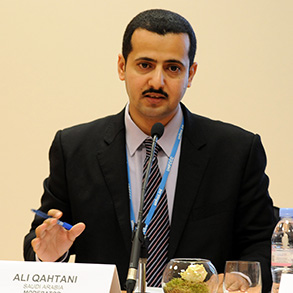 Ali Al-Qahtani, Saudi Aramco, explained Saudi Aramco has introduced energy efficiency technological solutions in an aggressive way.
Ali Al-Qahtani, Saudi Aramco, explained Saudi Aramco has introduced energy efficiency technological solutions in an aggressive way.
| 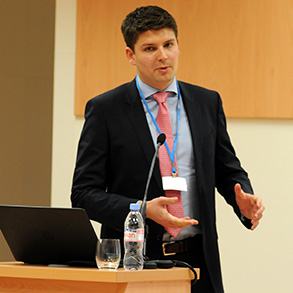 Hans Vander Velpen, SABIC, informed participants that SABIC has reduced its energy intensity by 5% compared with 2010 levels.
Hans Vander Velpen, SABIC, informed participants that SABIC has reduced its energy intensity by 5% compared with 2010 levels.
| 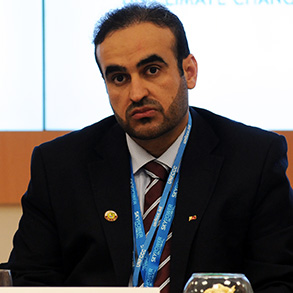 Abdulaziz Al Hammadi, Qatar, announced that Qatar has reduced energy and water consumption by 11%.
Abdulaziz Al Hammadi, Qatar, announced that Qatar has reduced energy and water consumption by 11%.
|
 Panel (L-R):
Ali Al-Qahtani, Saudi Aramco; Mohammed Al Mutawa, Ministry of Energy, UAE; Hans Vander Velpen, SABIC; Abdulaziz Al Hammadi, Qatar; William Roberts, King Abdullah University of Science and Technology (KAUST); Bashir Allogmany, Saudi Energy Efficiency Center; and Hussain Makki, National Climate Change Committee, Bahrain.
Panel (L-R):
Ali Al-Qahtani, Saudi Aramco; Mohammed Al Mutawa, Ministry of Energy, UAE; Hans Vander Velpen, SABIC; Abdulaziz Al Hammadi, Qatar; William Roberts, King Abdullah University of Science and Technology (KAUST); Bashir Allogmany, Saudi Energy Efficiency Center; and Hussain Makki, National Climate Change Committee, Bahrain.
|
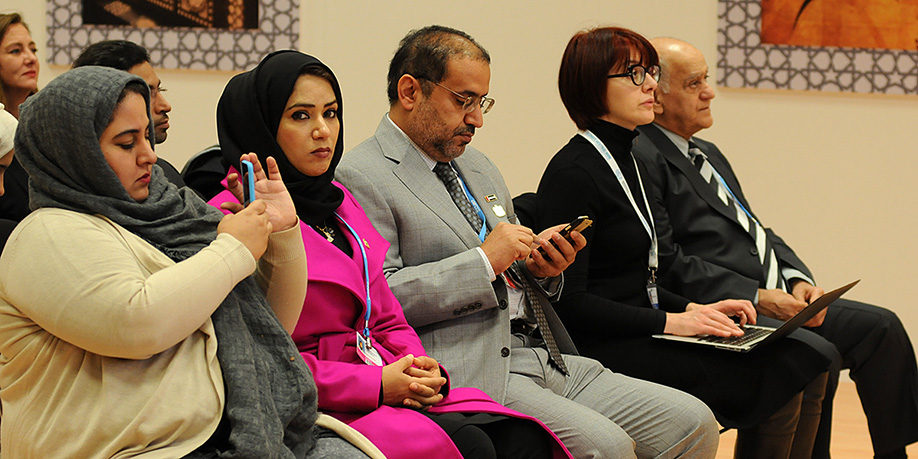
|
Strategic Climate Change Partnerships: Opportunities and Actions in Developing Countries – Lessons from Kenya Presented by: Government of Kenya
This session was moderated by Stephen King’uyu, Low Emission Development Strategies (LEDS) Global Partnership. Judi Wakhungu, Cabinet Secretary, Ministry of Environment and Natural Resources, Kenya, announced the country’s actions to combat climate change, noting the enactment of a climate bill by the country’s parliament. She noted that partnerships and interministerial actions will be key to implementing adaptation and mitigation measures. She then officially launched the publication ‘Addressing Climate Change: Success Stories from Kenya.’
Sam Bickersteth, CEO, Climate and Development Knowledge Network (CDKN), noted the need to address gaps in finance, knowledge, and policy and regulation to implement the country’s Intended Nationally Determined Contribution (INDC). He noted that the groundwork is already laid out - with adaptation goals set and a target to reduce greenhouse gas emissions by 30% - but underscored that commitment is necessary to achieve these goals.
Eric Postel, US Agency for International Development (USAID), noted that the interests of the US and Kenya are aligned on climate change, drawing attention to the need for strong country-level actions in reducing emissions. He highlighted work done by USAID in the development of Kenya’s INDC, and noted work on supporting the country’s green energy forecasting capabilities.
Winnie Musila, System for Land‐based Emissions Estimation in Kenya (SLEEK), discussed the SLEEK monitoring, reporting and verification (MRV) system, which provides data for reporting on land-based emissions to the UNFCCC. She noted that SLEEK also collects data for policymaking, and assists in planning land-restoration activities, highlighting the development of an accessible full land integration tool.
Deborah Murphy, Department for International Development (DFID), UK, noted the strong partnerships built during the development of Kenya’s INDC across all government levels, as well as with civil society and the private sector. She highlighted DFID’s work in climate finance for climate smart agriculture, and drew attention to a fund on technology and innovation for clean energy and adaptation.
Participants then discussed the need for accurate data for the verification of emissions; the importance of partnerships; the importance of sharing lessons learned; and the need to focus on implementation and action. Others pointed to the communication gap between civil society and the government; and the need to engage local communities in addressing climate change.
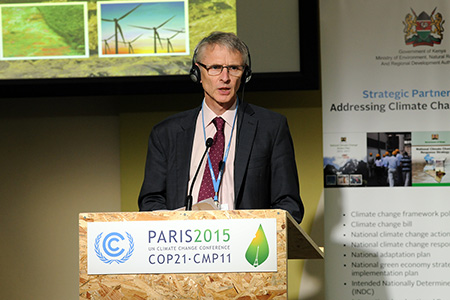 Sam Bickersteth, CEO, CDKN, lauded ongoing work at the national level, highlighting key multistakeholder partnerships which worked on the development of the INDCs.
Sam Bickersteth, CEO, CDKN, lauded ongoing work at the national level, highlighting key multistakeholder partnerships which worked on the development of the INDCs.
| 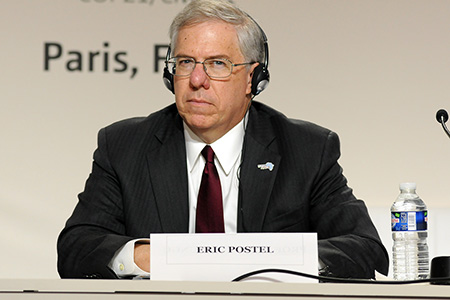 Eric Postel, USAID, highlighted a partnership between Kenya, USAID and the UN Development Programme on low-emission climate resilience work in the country.
Eric Postel, USAID, highlighted a partnership between Kenya, USAID and the UN Development Programme on low-emission climate resilience work in the country.
|
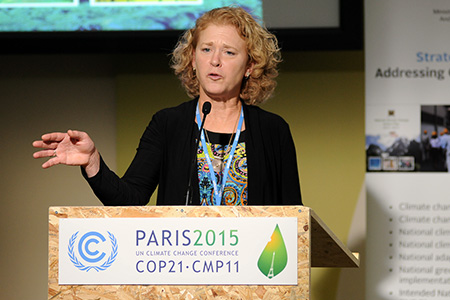 Deborah Murphy, DFID, UK, drew attention to work on Kenya’s climate change bill and policy, as well as the national adaptation plan and various initiatives on climate finance.
Deborah Murphy, DFID, UK, drew attention to work on Kenya’s climate change bill and policy, as well as the national adaptation plan and various initiatives on climate finance.
| 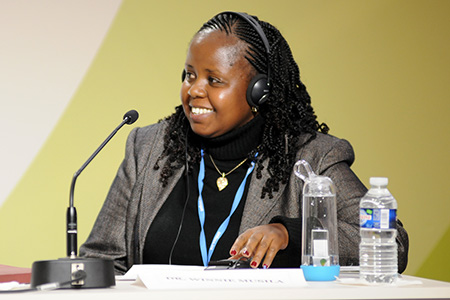 Winnie Musila, SLEEK, informed delegates that SLEEK is funded by Australia and supported by the Clinton Foundation.
Winnie Musila, SLEEK, informed delegates that SLEEK is funded by Australia and supported by the Clinton Foundation.
|
 Panel (L-R):
Stephen King’uyu, LEDS Global Partnership; Deborah Murphy, DFID, UK; Eric Postel, USAID; Sam Bickersteth, CEO, CDKN; and Winnie Musila, SLEEK.
Panel (L-R):
Stephen King’uyu, LEDS Global Partnership; Deborah Murphy, DFID, UK; Eric Postel, USAID; Sam Bickersteth, CEO, CDKN; and Winnie Musila, SLEEK.
|
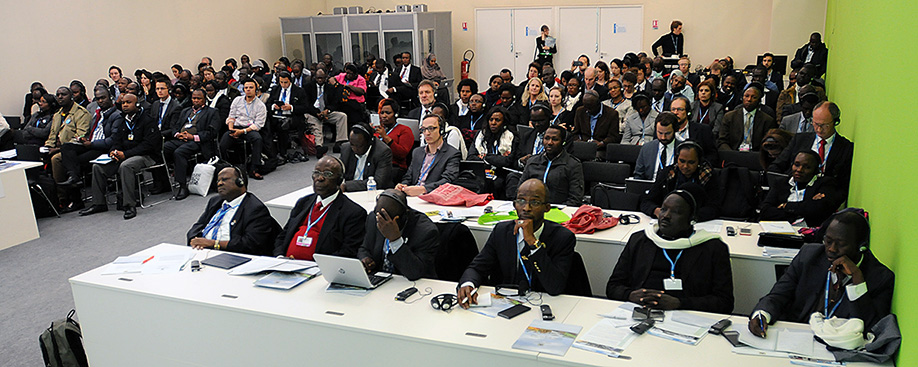
|
East Asia Low Carbon Growth Dialogue Presented by: The Ministry of Foreign Affairs, Japan (MOFA); the Ministry of the Environment, Japan (MOEJ); the Institute for Global Environmental Strategies (IGES); the National Institute for Environmental Studies (NIES); and the University of Technology Malaysia (UTM)
This side event, moderated by Junichi Fujino, NIES, discussed concrete steps to realize low-carbon development through the promotion of public-private partnerships and the introduction of environmental technologies in the East Asia Summit (EAS) region.
Tamayo Marukawa, Minister of Environment, Japan, noted that the 187 INDCs are a big step towards the realization of goals related to climate change, but additional efforts are needed to stay below the 2°C target.
Hironori Hamanaka, Chair of the Board of Directors, IGES, provided an overview of IGES’ work areas, roles and partnerships, highlighting, among others: the implementation of the Joint Crediting Mechanism (JCM); the importance of non-state actors, such as cities and private companies; and the need to share best practices, build capacity, and transfer and diffuse technology.
Amb. Masahiko Horie, MOFA, highlighted past achievements of the East Asia Low Carbon Growth Partnership Dialogues and focused on the three pillars of the partnership, namely: development and implementation of national low-carbon growth strategies; utilization of technologies and market mechanisms; and the development of effective networks among various stakeholders.
Van Anh Nguyen, Ministry of Natural Resources and Environment, Viet Nam, identified the energy and agricultural sectors as the main GHG emission contributors in Viet Nam and focused on, inter alia: NAMA preparation, activities and relation to Vietnamese institutions; a proposed structure for a monitoring, reporting and verification (MRV) system; gaps and constraints; and next steps at the national level.
Kamal Uy, Ministry of Environment, Cambodia, presented on Cambodia’s Intended Nationally Determined Contribution (INDC). He highlighted that the JCM is: a win-win approach in the context of climate change response, technology transfer and economic and environmental sustainable development; an effective tool in achieving GHG emission reductions; and aligned with a low-carbon development pathway.
Kazuhisa Koakutsu, IGES, focused on current developments under the JCM. He stressed, among others: operations to date; signatories; typical sectors for JCM projects; examples of registered projects; and implementation in the future, noting that following the adoption and implementation of the JCM, many countries have increased their capacity to develop institutional arrangements and attract new emission reduction projects.
Haji Hashim Bin Haji Ismail, President of Putrajaya Corporation, Malaysia, shared experiences on low-carbon development in the city of Putrajaya, including a building sector carbon emissions monitoring and reporting program, and initiatives on transportation and mobility. He highlighted the implementation of Putrajaya Green City 2025 initiative, which aims to transform the urban area to a sustainable, low carbon, green city by 2025.
Kentaro Tamura, IGES, stressed that: what matters is action on the ground; lessons should be shared to move forward; and the Asian model’s potential for universal application.
Ho Chin Siong, UTM, underscored the importance of: market mechanisms; networks of stakeholders; and the East Asia Low Carbon Growth Partnership Dialogue as a platform to move from science to action.
Ismail Ibrahim, Chief Executive, Iskandar Regional Development Authority (IRDA), Malaysia, highlighted the Authority’s efforts to follow a low-carbon development path. He stressed the need to involve the private sector and to establish strong policies at the national and regional levels to move towards actions on the ground.
In the ensuing discussion, participants addressed, inter alia: the special characteristics of the JCM; the notion of total decarbonization as a long-term goal; and third-party certification in energy efficiency in urban systems.
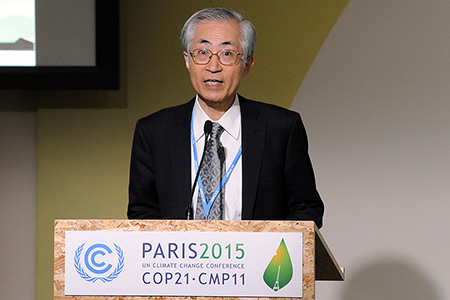 Hironori Hamanaka, Chair of the Board of Directors, IGES, stressed the need to transform commitments to actions on the ground and scale them up to collectively achieve emissions reductions.
Hironori Hamanaka, Chair of the Board of Directors, IGES, stressed the need to transform commitments to actions on the ground and scale them up to collectively achieve emissions reductions.
| 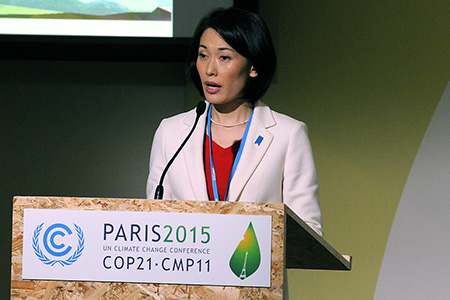 Tamayo Marukawa, Minister of Environment, Japan, noted that low-carbon growth is necessary to strike a balance between environmental protection and economic growth.
Tamayo Marukawa, Minister of Environment, Japan, noted that low-carbon growth is necessary to strike a balance between environmental protection and economic growth.
|
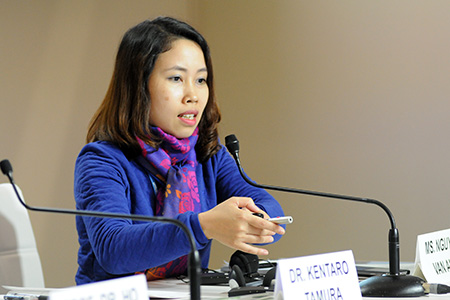 Van Anh Nguyen, Ministry of Natural Resources and Environment, Viet Nam, underscored the establishment of a national GHG inventory system as an important future step in Viet Nam.
Van Anh Nguyen, Ministry of Natural Resources and Environment, Viet Nam, underscored the establishment of a national GHG inventory system as an important future step in Viet Nam.
| 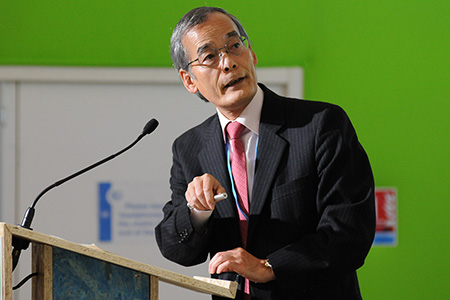 Amb. Masahiko Horie, MOFA, stressed that the EAS region is the center of gravity of the world economy, accounting for approximately 63% of CO2 emissions.
Amb. Masahiko Horie, MOFA, stressed that the EAS region is the center of gravity of the world economy, accounting for approximately 63% of CO2 emissions.
|
 Panel (L-R):
Junichi Fujino, NIES; Kamal Uy, Ministry of Environment, Cambodia; Amb. Masahiko Horie, MOFA; Ho Chin Siong, UTM; Kentaro Tamura, IGES; and Van Anh Nguyen, Ministry of Natural Resources and Environment, Viet Nam.
Panel (L-R):
Junichi Fujino, NIES; Kamal Uy, Ministry of Environment, Cambodia; Amb. Masahiko Horie, MOFA; Ho Chin Siong, UTM; Kentaro Tamura, IGES; and Van Anh Nguyen, Ministry of Natural Resources and Environment, Viet Nam.
|
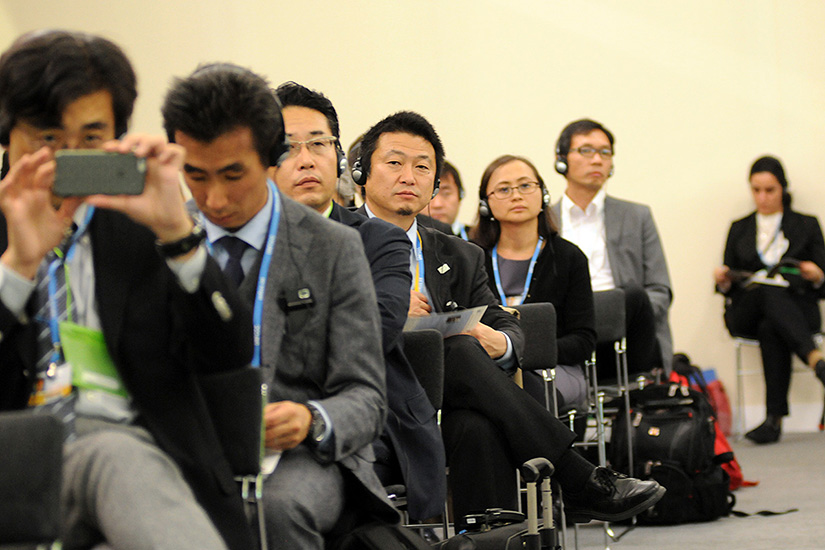
|
Contacts:
- Junichi Fujino (Coordinator) | int-unfccc@nies.go.jp
- Kazuhisa Koakutsu (Coordinator) | koakutsu@iges.or.jp
- Shihori Maeda (Coordinator) | shihori.maeda@mofa.go.jp
- Koichi Okabe (Coordinator) | koichi.okabe@gmail.com
More Information:
The 1 Gigaton Coalition: Ministerial Launch of its First Report on Narrowing the Emisions Gap: Contributions from Renewable Energy and Energy Efficiency Activities
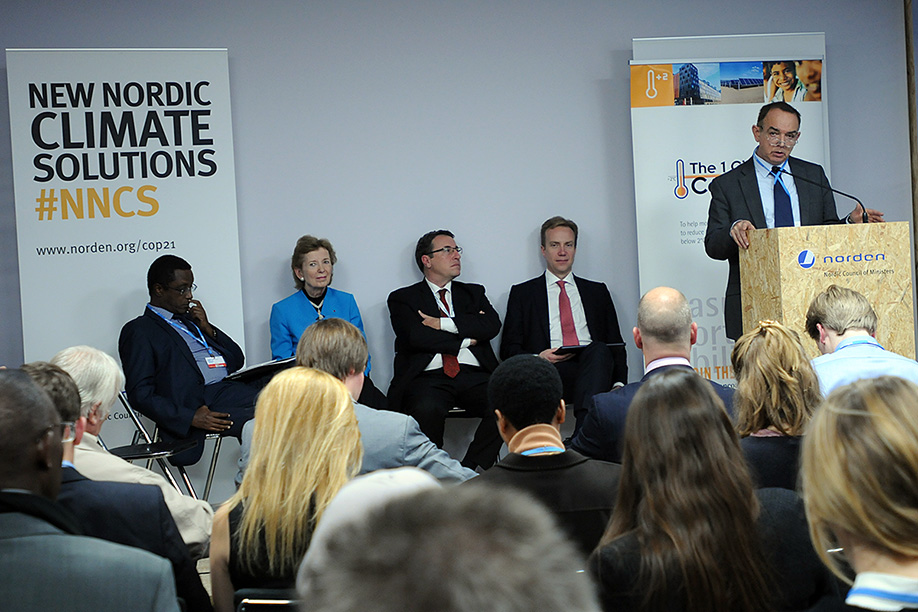 Panel during the The 1 Gigaton Coalition side event
Panel during the The 1 Gigaton Coalition side event
|
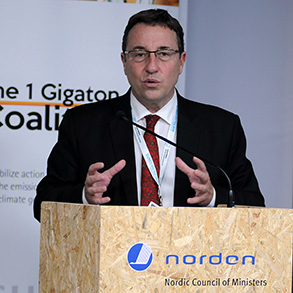 Achim Steiner, UNEP Executive Director
Achim Steiner, UNEP Executive Director
| 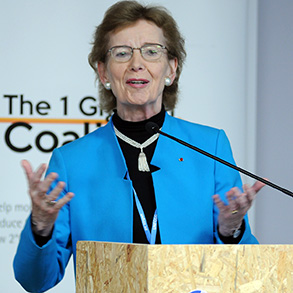 Mary Robinson, Special Envoy of the UN Secretary-General on Climate Change
Mary Robinson, Special Envoy of the UN Secretary-General on Climate Change
| 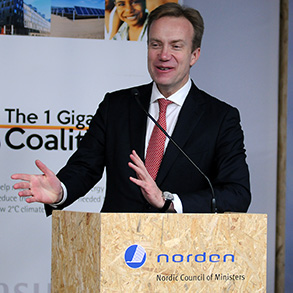 Børge Brende, Minister of Foreign Affairs, Norway
Børge Brende, Minister of Foreign Affairs, Norway
|
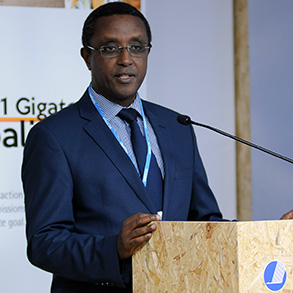 Vincent Biruta, Minister of Natural Resources, Rwanda
Vincent Biruta, Minister of Natural Resources, Rwanda
| 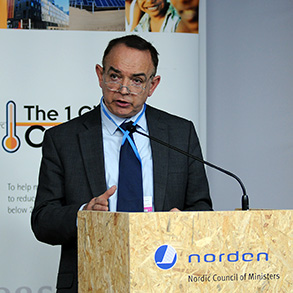 Lord Bourne of Aberystwyth Parliamentary Under-Secretary Department of Energy and Climate Change, UK
Lord Bourne of Aberystwyth Parliamentary Under-Secretary Department of Energy and Climate Change, UK
| 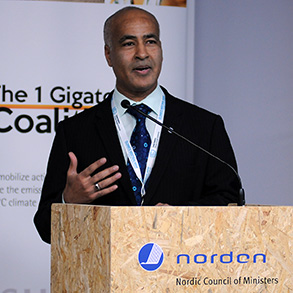 Zitouni Ould-Dada, UNEP
Zitouni Ould-Dada, UNEP
|
The Importance of Addressing Oceans and Coasts in an Ambitious Agreement at the UNFCCC COP 21
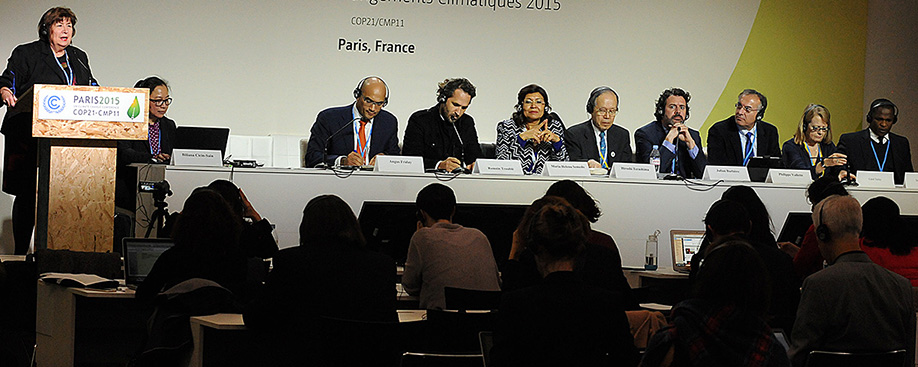
|
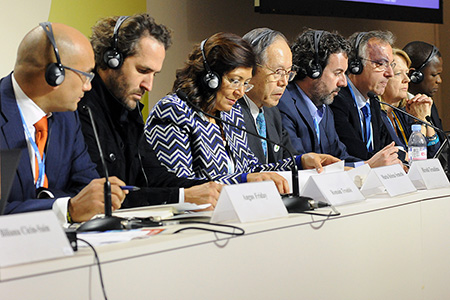
| 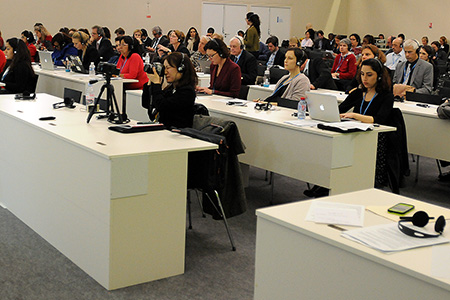
|
The Earth Negotiations Bulletin on the Side (ENBOTS) © <enb@iisd.org> is a special publication of the International Institute for Sustainable Development (IISD). This issue has been written by Lynn Finnegan, Tallash Kantai, Gillian Nelson, Ph.D., Annalisa Savaresi, Ph.D., and Asterios Tsioumanis, Ph.D. The Digital Editors are Naomi Devine and Brad Vincelette. The Editor is Dan Birchall <dan@iisd.org>. The Director of IISD Reporting Services is Langston James “Kimo” Goree VI <kimo@iisd.org>. The Sustaining Donors of the Bulletin are the European Union, the Government of Switzerland (the Swiss Federal Office for the Environment (FOEN), the Swiss Agency for Development and Cooperation (SDC)), and the Kingdom of Saudi Arabia. General Support for the Bulletin during 2015 is provided by the German Federal Ministry for the Environment, Nature Conservation, Building and Nuclear Safety (BMUB), the New Zealand Ministry of Foreign Affairs and Trade, SWAN International, the Finnish Ministry for Foreign Affairs, the Japanese Ministry of Environment (through the Institute for Global Environmental Strategies - IGES), the United Nations Environment Programme (UNEP), and the International Development Research Centre (IDRC). The opinions expressed in ENBOTS are those of the authors and do not necessarily reflect the views of IISD and funders. Excerpts from ENBOTS may be used in non-commercial publications only with appropriate academic citation. For permission to use this material in commercial publications, contact the Director of IISD Reporting Services at <kimo@iisd.org>. Electronic versions of issues of ENBOTS from the Paris Climate Change Conference - November 2015, can be found on the IISD Reporting Services website at http://enb.iisd.org/climate/cop21/enbots/. The ENBOTS Team at the Paris Climate Change Conference - November 2015, can be contacted by e-mail at <tallash@iisd.org>. |
||
|
IISD Reporting Services is grateful to the many donors of the Earth Negotiations Bulletin (ENB) and recognizes the following as core contributors to the ENB: the European Union, the Finnish Ministry for Foreign Affairs, the German Federal Ministry for the Environment, Nature Conservation, Building and Nuclear Safety (BMUB), the International Development Research Centre (IDRC), the Japanese Ministry of Environment (through the Institute for Global Environmental Strategies - IGES), the New Zealand Ministry of Foreign Affairs and Trade, the Kingdom of Saudi Arabia, SWAN International, Government of Switzerland (the Swiss Federal Office for the Environment (FOEN), the Swiss Agency for Development Cooperation (SDC), and the United Nations Environment Programme (UNEP). Funding for translation of the Bulletin into French is provided by the Government of France, the Wallonia, Québec, and the International Organization of La Francophonie/Institute for Sustainable Development of La Francophonie (IOF/IFDD). |
||